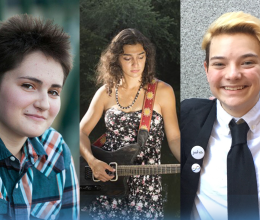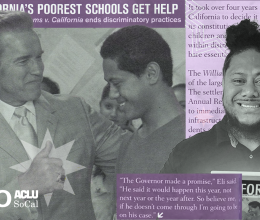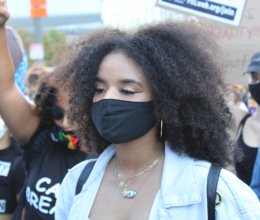
LOS ANGELES - A year after filing a lawsuit to stop federal policies designed to silence whistleblowers in the Federal Air Marshal Service, the ACLU of Southern California announced an agreement with the Department of Homeland Security and other government agencies that will permit marshals to speak about public safety concerns.
'We are very pleased that the government has agreed to clarify its policy, which was previously so vague that it effectively silenced members of the air marshals,' said Peter Eliasberg, managing attorney for the ACLU/SC. 'It is of vital importance that there be clear rules about employee speech so that air marshals, can when necessary, bring to the attention of the public policies and practices that undermine the safety of our aviation system.'
As a part of the agreement, which was reached late Friday, the government has agreed to send an e-mail within the week to all federal air marshals clarifying its policy on what marshals can say publicly. In particular, the message will clarify the meaning of two policies that Federal Air Marshal Frank Terreri argued were unconstitutionally vague.
The message will also inform marshals that while the personnel policy does prohibit employees from undermining teamwork or public confidence, 'nothing in the (directive) is intended to limit the free public expression of an employees personal opinions about matters of public concern relating to the FAMS - provided the individual complies with all laws and policies safeguarding the unauthorized disclosure of official information.'
In the original lawsuit, filed in April 2005 against Department of Homeland Security Secretary Michael Chertoff and other security officials, Terreri challenged Federal Air Marshal Service rules that prohibited him from speaking publicly about his job or saying anything to do with the Air Marshal Service, a clear violation of his First Amendment rights.
The government changed its rules governing employee speech in July after the lawsuit was filed, but, like the previous policy, the new policy also contained speech-restrictive provisions. At the end of August 2005, Terreri amended his lawsuit to also challenge the constitutionality of the new policy. In February U.S. District Judge Edward Rafeedie denied the government's motion to dismiss the case and ruled that it should move forward toward a trial.
'I am grateful for this settlement,' Terreri said. 'Finally the American public will be able to hear an honest account of our federal air marshal program and air marshals interested in improving the public's safety will not have to risk their employment to do so.'
Terreri, who has 16 years of law enforcement experience with an unblemished record, has since been asked to testify in front of Congress about the federal air marshal program. For the past four years he has been a federal air marshal and is also a president of the air marshal division of a professional membership organization that represents more than 24,000 federal agents, including 1,400 air marshals.
The ACLU of Southern California, Professor Allan Ides of Loyola Law School and Paul Hoffman of Schonbrun, DeSimone, Seplow, Harris and Hoffman are representing Terreri.







